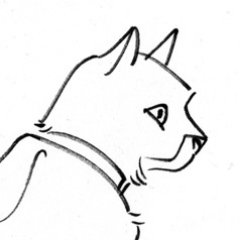This shape barely resembles a woman's profile...but in the larger scene, it works.
A scene isn't a collection of nicely drawn objects. It's a drawing of the way you might remember the whole array of those objects after the portrayed event. Think always on the overall effect.
If you have a subtle story to tell about form, go ahead and tell it. But if your shading only explains things readers could easily guess from the contours (see attached), grit your teeth and back slowly away from the brush tool.
There's a tragic urge, lately, to add subtle shading to every shape; a temptation to over-explain forms whose contours already explain them.
Here again, compare this unicorn art by Tsuguyuki Kubo (designer on Thundercats and The Last Unicorn) with a similar piece from She-Ra. The She-Ra art emphasizes the heft and volume of bone and flesh. But Kubo's fluid, undulating lines emphasize lyricism.
Also, in this 1st panel: note Parlov's judicious use of tonal hatching on the right side. He uses just enough to convey a murky, textured room, but doesn't let it overpower the scene.
In a similar shot, Paolo Serpieri textures EVERYTHING, leeching the panel of needed immediacy.
In this FURY panel, Goran Parlov haloes her hair, to differentiate it from the darkness. A precise white outline would attract undue attention, but his rough handling of the edges avoids that problem.
He also leaves more room around the hair's whipping edge, to suggest motion.
@sleepysumairu @_Shekmate_ Yeah, this advice won't be relevant to every style. Proceed accordingly!
Quick'n'dirty water method:
1) Make a gradient. This can be grey, blue, green -- whatever color.
2) Scribble some water textures with white lines on a new layer.
3) Duplicate that layer; darken the textures and lower them to the pool bottom.
4) Pool toys!
For example, the unique visions of these artists are revealed by how they each chose to illustrate Alice meeting the Caterpillar. (Kei Acedera, Harry Rountree, Bessie Pease Gutmann, Ralph Steadman.) (2/2)
Drawing complex objects in 3D:
1 Draw the object flat
2 Use transform tool to angle it into desired perspective
3 Duplicate. Extrude/bring forward one layer at 50% opacity. Leave the back layer at 25% opacity.
4 Connect layers using lines that converge at a point.
5 Erase excess.






















